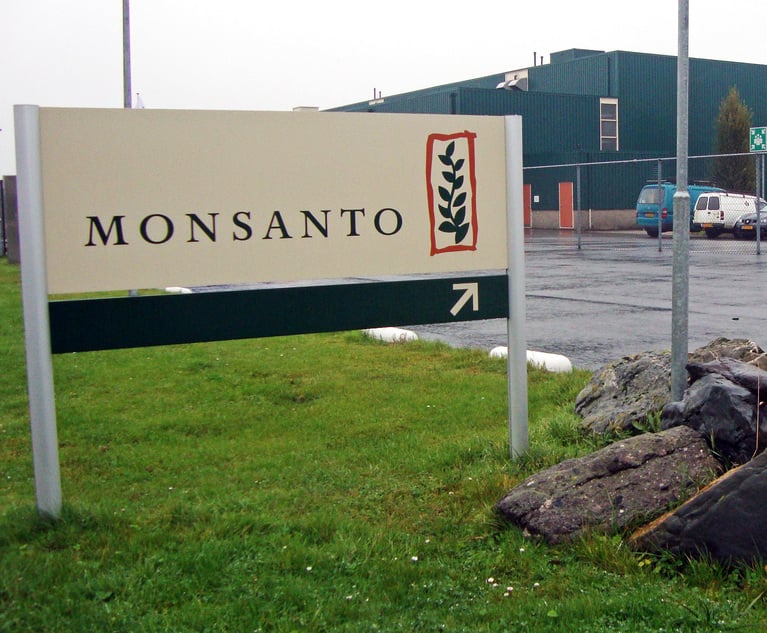Municipal Regulation of Agricultural Operations in Pennsylvania
Pennsylvania municipalities are “creatures of the state” and thus may only exercise those powers expressly and implicitly delegated to them by the General Assembly. One area in which municipalities have been delegated authority is the regulation of land uses.
December 20, 2018 at 04:12 PM
6 minute read
 Alyssa Golfieri and Blaine Lucas.
Alyssa Golfieri and Blaine Lucas.
Pennsylvania municipalities are “creatures of the state” and thus may only exercise those powers expressly and implicitly delegated to them by the General Assembly. One area in which municipalities have been delegated authority is the regulation of land uses. The Pennsylvania Municipalities Planning Code, 53 P.S. Section 10101 et seq., establishes the framework for zoning and subdivision and land development regulation in Pennsylvania. However, a municipality's powers are not without limitation. The General Assembly, by statute, has constrained the manner and degree to which municipalities can regulate certain types of land use. The Pennsylvania Right-to-Farm Act, 3 P.S. Section 951 et seq., (RTFA) and the Pennsylvania Agricultural, Communities and Rural Environment Act, 3 Pa.C.S. Section 311 et seq., (ACRE) are two such examples.
The RTFA was enacted in 1982 for the purpose of limiting the circumstances under which “normal agricultural operations” may be the subject matter of nuisance suits and zoning regulations. Specifically, the RTFA mandates that every municipality regulating a public nuisance exempt from its scope “normal agricultural operations” as long as the operations do not have a “direct adverse effect on the public health and safety.” It also requires municipalities to permit the direct sale of agricultural commodities on property owned and operated by a landowner who produces 50 percent or more of the commodities sold, regardless of applicable zoning regulations.
In 2005, the General Assembly recognized that owners and operators of normal agricultural operations needed a cost and time efficient way to challenge local regulatory actions running afoul of the RTFA and, in response, enacted ACRE. ACRE provides a means for those engaged in these activities to challenge and seek the invalidation of unauthorized ordinances or enforcement actions related to those ordinances. If an owner or operator believes a local municipality's ordinance(s) or enforcement action(s) are inhibiting his operations in violation of state law, he may request that the attorney general initiate a review of the same. Upon receipt of such a request, the attorney general has 120 days to review the challenged ordinance or enforcement action and determine, in his or her sole discretion, whether to bring a legal action against the municipality in Commonwealth Court. Any person aggrieved by an unauthorized local ordinance also can bring an action in Commonwealth Court.
While the above-referenced restrictions on a municipality's authority to regulate agricultural operations appear relatively elementary and straightforward, the devil is in the details. ACRE incorporates by reference the RTFA's definition of “normal agricultural operation,” interpretation and application of which recently has become the cause of much debate. The Pennsylvania Commonwealth Court, Pennsylvania attorney general, and several municipalities across the commonwealth have interpreted the definition narrowly to include only those activities associated with the production and preparation of crops and livestock for market. Conversely, owners and operators of agricultural operations contend that the definition should be interpreted more broadly to include, among other things, agritainment, agribusiness, and agritourism—all terms used interchangeably to describe farm-themed entertainment, such as hayrides, cornfield maze contests, wine tastings, harvest festivals, farm-to-table dinners, weddings and farm stays (i.e., short-term rentals). Such activities are touted as boosting an operation's income, but are geared solely toward consumer experiences and do not contribute to nor are they necessary for an operation's preparation and production of crops and livestock for market.
The RTFA defines “normal agricultural operation” as: The activities, practices, equipment and procedures that farmers adopt, use or engage in the production and preparation for market of poultry, livestock and their products and in the production, harvesting and preparation for market or use of agricultural, agronomic, horticultural, silvicultural and aquacultural crops and commodities and is:
- Not less than 10 contiguous acres in area; or
- Less than 10 contiguous acres in area but has an anticipated yearly gross income of at least $10,000.
The term includes new activities, practices, equipment and procedures consistent with technological development within the agricultural industry. Use of equipment shall include machinery designed and used for agricultural operations, including, but not limited to, crop dryers, feed grinders, saw mills, hammer mills, refrigeration equipment, bins and related equipment used to store or prepare crops for marketing and those items of agricultural equipment and machinery defined by [the Farm Safety and Occupational Health Act].
The Commonwealth Court narrowly interpreted this definition in Tinicum Township v. Nowicki, 99 A.3d 586 (Pa. Commw. Ct. 2014). The court concluded that a mulching operation did not qualify as a normal agricultural operation and therefore was not afforded RTFA protection because the raw materials from the operation were not produced on the property and the resulting mulch was not used for the production of livestock, crops or agricultural commodities on the property. The court, emphasizing that the definition of normal agricultural operation under the RTFA “focuses on the use of farmland for the production of crops and livestock,” explained that:
“We believe that the definition of 'normal agricultural operation' necessarily requires some connection between the use at issue and the employment of the property in question for the production of an agricultural, agronomic, horticultural, silvicultural or aquacultural crop or commodity.”
In addition, in the attorney general's 2012 through 2016 Annual ACRE Reports, the attorney general has declined to take legal action against municipalities that have attempted to apply zoning regulations to an operation's on-site promotional, entertainment, and recreational events and agribusiness or agritainment activities. In doing so, the attorney general has determined, at least implicitly that such activities do not fall within the RTFA's and ACRE's definition of normal agricultural operation and therefore are subject in full to local zoning regulation.
Thus, under the current state of the law, agritainment, agritourism and agribusiness are not afforded RTFA's and ACRE's protections from municipal zoning regulation, and those wishing to engage in these activities must consult local ordinances to ascertain whether these uses are authorized in the applicable zoning district, and what the applicable approval criteria and standards are for these uses (e.g., hours of operation, minimum parking requirements, and maximum noise and light restrictions).
Blaine A. Lucas is a shareholder and Alyssa E. Golfieri an associate in the public sector services and energy and natural resources groups of the Pittsburgh law firm of Babst, Calland, Clements & Zomnir. In these capacities, Lucas coordinates the firm's representation of energy clients on land use and other local regulatory matters. He also teaches land use law at the University of Pittsburgh School of Law. Golfieri focuses her practice on zoning, subdivision, land development, code enforcement and public bidding matters. Contact them at [email protected] and [email protected].
This content has been archived. It is available through our partners, LexisNexis® and Bloomberg Law.
To view this content, please continue to their sites.
Not a Lexis Subscriber?
Subscribe Now
Not a Bloomberg Law Subscriber?
Subscribe Now
NOT FOR REPRINT
© 2025 ALM Global, LLC, All Rights Reserved. Request academic re-use from www.copyright.com. All other uses, submit a request to [email protected]. For more information visit Asset & Logo Licensing.
You Might Like
View All

'Close Our Borders?' Senate Judiciary Committee Examines Economics, Legal Predicate for Mass Deportation Proposal
3 minute read
'Serious Misconduct' From Monsanto Lawyer Prompts Mistrial in Chicago Roundup Case
3 minute read
Monsanto Scores 2nd Phila. Roundup Verdict, but Fails to Stop Impending Trial
3 minute readTrending Stories
- 111th Circuit Rejects Trump's Emergency Request as DOJ Prepares to Release Special Counsel's Final Report
- 2Supreme Court Takes Up Challenge to ACA Task Force
- 3'Tragedy of Unspeakable Proportions:' Could Edison, DWP, Face Lawsuits Over LA Wildfires?
- 4Meta Pulls Plug on DEI Programs
- 5On the Move and After Hours: Meyner and Landis; Cooper Levenson; Ogletree Deakins; Saiber
Who Got The Work
Michael G. Bongiorno, Andrew Scott Dulberg and Elizabeth E. Driscoll from Wilmer Cutler Pickering Hale and Dorr have stepped in to represent Symbotic Inc., an A.I.-enabled technology platform that focuses on increasing supply chain efficiency, and other defendants in a pending shareholder derivative lawsuit. The case, filed Oct. 2 in Massachusetts District Court by the Brown Law Firm on behalf of Stephen Austen, accuses certain officers and directors of misleading investors in regard to Symbotic's potential for margin growth by failing to disclose that the company was not equipped to timely deploy its systems or manage expenses through project delays. The case, assigned to U.S. District Judge Nathaniel M. Gorton, is 1:24-cv-12522, Austen v. Cohen et al.
Who Got The Work
Edmund Polubinski and Marie Killmond of Davis Polk & Wardwell have entered appearances for data platform software development company MongoDB and other defendants in a pending shareholder derivative lawsuit. The action, filed Oct. 7 in New York Southern District Court by the Brown Law Firm, accuses the company's directors and/or officers of falsely expressing confidence in the company’s restructuring of its sales incentive plan and downplaying the severity of decreases in its upfront commitments. The case is 1:24-cv-07594, Roy v. Ittycheria et al.
Who Got The Work
Amy O. Bruchs and Kurt F. Ellison of Michael Best & Friedrich have entered appearances for Epic Systems Corp. in a pending employment discrimination lawsuit. The suit was filed Sept. 7 in Wisconsin Western District Court by Levine Eisberner LLC and Siri & Glimstad on behalf of a project manager who claims that he was wrongfully terminated after applying for a religious exemption to the defendant's COVID-19 vaccine mandate. The case, assigned to U.S. Magistrate Judge Anita Marie Boor, is 3:24-cv-00630, Secker, Nathan v. Epic Systems Corporation.
Who Got The Work
David X. Sullivan, Thomas J. Finn and Gregory A. Hall from McCarter & English have entered appearances for Sunrun Installation Services in a pending civil rights lawsuit. The complaint was filed Sept. 4 in Connecticut District Court by attorney Robert M. Berke on behalf of former employee George Edward Steins, who was arrested and charged with employing an unregistered home improvement salesperson. The complaint alleges that had Sunrun informed the Connecticut Department of Consumer Protection that the plaintiff's employment had ended in 2017 and that he no longer held Sunrun's home improvement contractor license, he would not have been hit with charges, which were dismissed in May 2024. The case, assigned to U.S. District Judge Jeffrey A. Meyer, is 3:24-cv-01423, Steins v. Sunrun, Inc. et al.
Who Got The Work
Greenberg Traurig shareholder Joshua L. Raskin has entered an appearance for boohoo.com UK Ltd. in a pending patent infringement lawsuit. The suit, filed Sept. 3 in Texas Eastern District Court by Rozier Hardt McDonough on behalf of Alto Dynamics, asserts five patents related to an online shopping platform. The case, assigned to U.S. District Judge Rodney Gilstrap, is 2:24-cv-00719, Alto Dynamics, LLC v. boohoo.com UK Limited.
Featured Firms
Law Offices of Gary Martin Hays & Associates, P.C.
(470) 294-1674
Law Offices of Mark E. Salomone
(857) 444-6468
Smith & Hassler
(713) 739-1250





